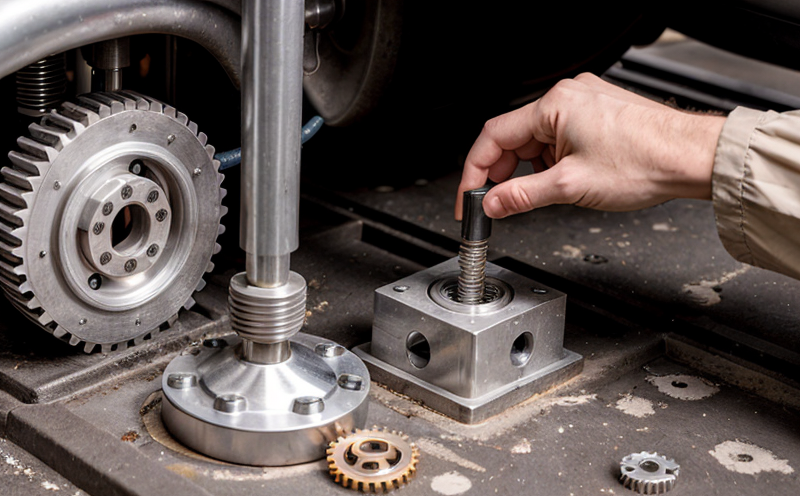ASTM D7426 Mechanical Property Testing of Powder Bed Fusion Plastics
The ASTM D7426 standard provides a method for determining mechanical properties of parts produced using powder bed fusion (PBF) technologies. This service is critical in ensuring the quality, reliability, and performance of manufactured components across various sectors such as aerospace, automotive, medical devices, and more.
PBF technologies like Selective Laser Sintering (SLS) and Direct Metal Laser Sintering (DMLS) are widely used for additive manufacturing. These processes involve melting metal or polymer powders to build parts layer by layer. However, the mechanical properties of these parts can vary significantly depending on factors such as powder type, laser power settings, scan speed, and post-processing.
The ASTM D7426 test method is designed to evaluate tensile strength, elongation at break, yield strength, and modulus of elasticity for parts fabricated using PBF. This service is essential for quality assurance (QA) teams, compliance officers, R&D engineers, and procurement professionals who need to ensure that parts meet the required standards.
Before testing begins, the specimens must be carefully prepared according to ASTM D7426 guidelines. This involves selecting appropriate dimensions for tensile tests based on the part size and ensuring that the samples are free from defects such as porosity or inclusions. Specimens can be cut from the manufactured parts using saws, mills, or waterjet technology.
The testing process itself is conducted using specialized mechanical testers capable of applying controlled loads to the specimens until failure. The tester measures the load and displacement data during the test, which are then used to calculate key mechanical properties such as tensile strength (PSI) and elongation at break (%).
Once the tests are completed, detailed reports are generated that include all relevant parameters along with graphical representations of stress-strain curves. These reports serve as valuable tools for quality managers, compliance officers, R&D teams, and procurement personnel to make informed decisions about part acceptance or rejection.
The ASTM D7426 test is particularly important in industries where component failure could lead to catastrophic consequences, such as aerospace manufacturing. By ensuring that parts meet the required mechanical property specifications, this service helps prevent accidents and improves overall safety standards.
In addition to meeting regulatory requirements set forth by organizations like NASA or FAA, compliance with ASTM D7426 also enhances a company's reputation among customers who demand high-quality products. It demonstrates a commitment to excellence in manufacturing processes and materials selection.
Furthermore, this service allows companies to stay competitive within their respective markets by providing consistent product quality across different batches of parts produced using PBF technologies. Consistent results enable manufacturers to optimize production processes continuously while maintaining strict adherence to industry standards.
Benefits
Ensures compliance with industry standards such as ASTM D7426 for powder bed fusion parts.
Maintains consistent product quality across different batches of parts produced using PBF technologies.
Provides detailed reports including stress-strain curves which serve valuable tools for decision-making by QA teams, compliance officers, R&D engineers, and procurement personnel.
Helps prevent accidents in safety-critical industries such as aerospace manufacturing.
Demonstrates a commitment to excellence in manufacturing processes and materials selection among customers demanding high-quality products.
Enhances a company's reputation within its market by ensuring consistent part quality.
Quality and Reliability Assurance
The ASTM D7426 mechanical property testing service plays an integral role in maintaining quality and reliability across various sectors. By ensuring that parts meet the required mechanical property specifications, this service helps prevent accidents and improves overall safety standards.
In industries where component failure could lead to catastrophic consequences, such as aerospace manufacturing or medical device production, ASTM D7426 testing is crucial. It ensures that parts fabricated using PBF technologies adhere to strict quality control measures, thereby enhancing product reliability and customer satisfaction.
Consistent results from ASTM D7426 tests allow manufacturers to optimize their production processes continuously while maintaining strict adherence to industry standards. This not only improves the overall quality of manufactured components but also contributes positively to a company's reputation in competitive markets.
For regulatory compliance, especially for organizations like NASA or FAA which have stringent requirements regarding material integrity and performance, ASTM D7426 testing provides peace of mind that parts will meet these standards. This service ensures that all necessary checks are performed before any part is approved for use, thus safeguarding public safety.
Competitive Advantage and Market Impact
The ASTM D7426 mechanical property testing service offers significant competitive advantages to companies operating in industries reliant on high-quality parts produced through powder bed fusion technologies. By ensuring consistent part quality across different batches, this service helps maintain a stable supply chain that meets customer expectations.
Consistent results from ASTM D7426 tests enable manufacturers to optimize their production processes continuously while adhering strictly to industry standards. This leads to improved product performance and reliability, which translates into satisfied customers and increased market share.
In competitive markets where product quality is paramount, the ability to offer consistent part quality through ASTM D7426 testing sets companies apart from competitors who may not have such robust quality assurance procedures in place. It demonstrates a commitment to excellence that appeals directly to discerning consumers looking for reliability and longevity in their purchased products.
Moreover, by ensuring compliance with industry standards like those set forth by NASA or FAA, this service enhances a company's reputation among regulatory bodies and customers alike. This positive perception can lead to increased business opportunities and long-term relationships built on trust.





